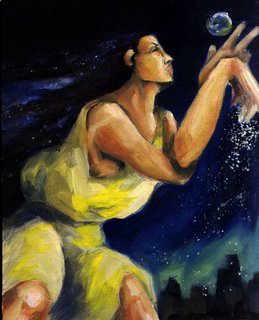 Solstice rites are one of our oldest celebrations, dating back to the dawn of modern civilization some 30,000 years ago. For ancient peoples, the winter solstice was an awesome, mysterious, and powerful phenomenon.
Solstice rites are one of our oldest celebrations, dating back to the dawn of modern civilization some 30,000 years ago. For ancient peoples, the winter solstice was an awesome, mysterious, and powerful phenomenon.Those of us today who have ever pondered the ramifications of a cataclysmic event such as a "nuclear winter" or the aftermath of a giant meteor impact after some ober-budget blockbuster movie can understand how frightening it must have been to see the sun slip away every fall. Harsh winter conditions and scarce food supplies made survival risky. Vegetation was dormant, migratory birds had long since disappeared to warmer climes, and many animals had vanished into hibernation. As the weeks drew closer to the solstice, it was a time of anxiety over ever-darkening days. What if the sun lost its vigor and never came back? Would light and warmth simply fade away forever? Would the earth be wrapped in eternal night and cold?
But then, magically, the long night would end, the sun would return, and slowly the earth would warm and provide for its people once more.
No one's really sure how long ago humans recognized the winter solstice and began heralding it as a turning point -- the day that marks the return of the sun. But that is what it is - a heralding of light, a joyous reach toward the future and all the beauty and hope it holds. Tonight is for reveling, for rejoicing, for accepting that the dark has passed and the light is slowly creeping in. It *will* return, it has begun to - and we in turn shall find joy in what lies ahead of us.
It's the root of the Christmas traditions - the birth of the sun, the birth of the son. Both stand for a world awakening, rejoicing, finding itself bathed in a blessed light. I hope you all have wonderful, beautiful and hopeful holidays.
Happy Solstice! Merry Yule! Brightest blessings, indeed.
"Shall we liken Christmas to the web in a loom? There are many weavers, who work into the pattern the experience of their lives. When one generation goes, another comes to take up the weft where it has been dropped. The pattern changes as the mind changes, yet never begins quite anew. At first, we are not sure that we discern the pattern, but at last we see that, unknown to the weavers themselves, something has taken shape before our eyes, and that they have made something very beautiful, something which compels our understanding." --Earl W. Count, 4,000 Years of Christmas





No comments:
Post a Comment